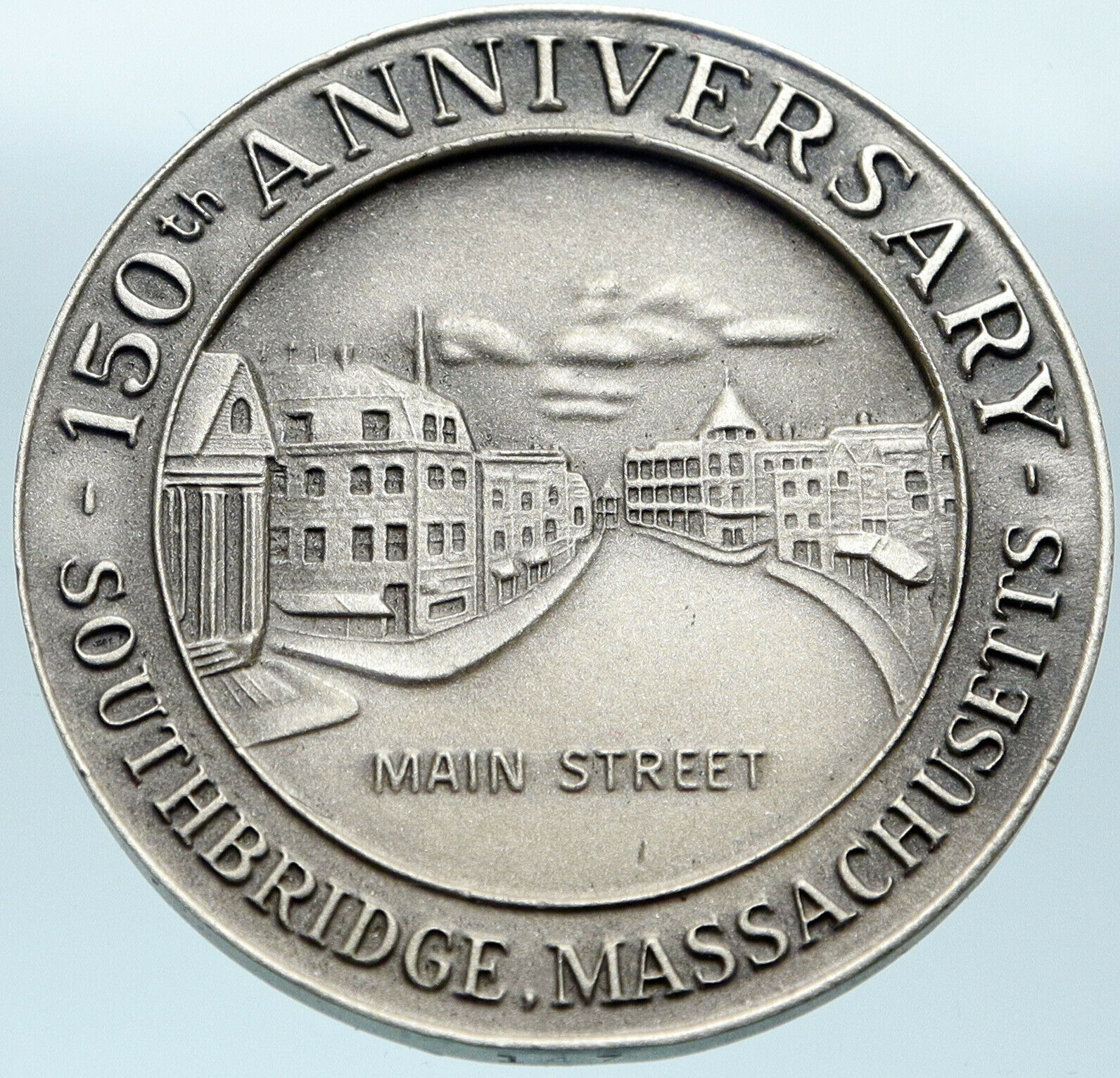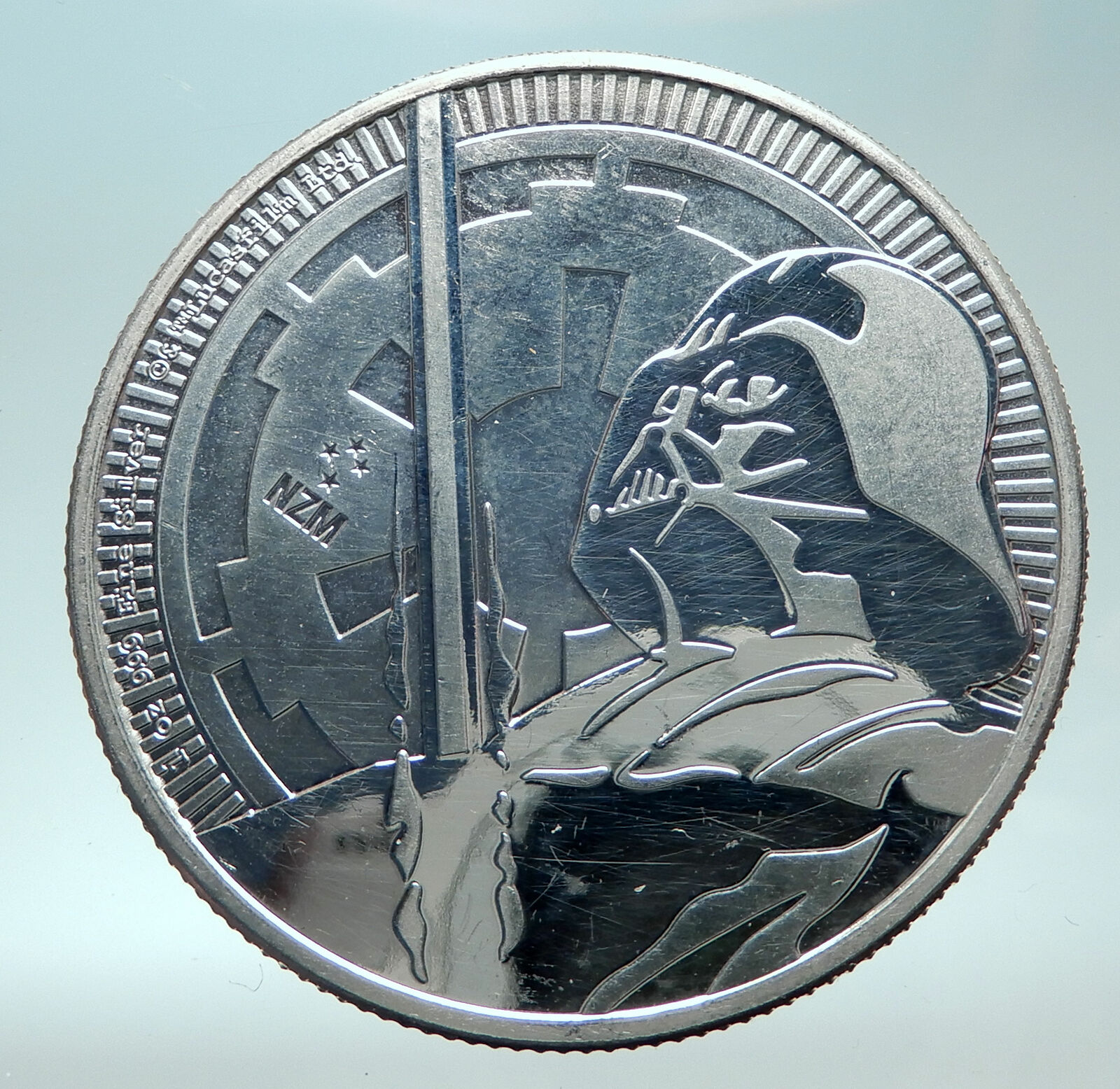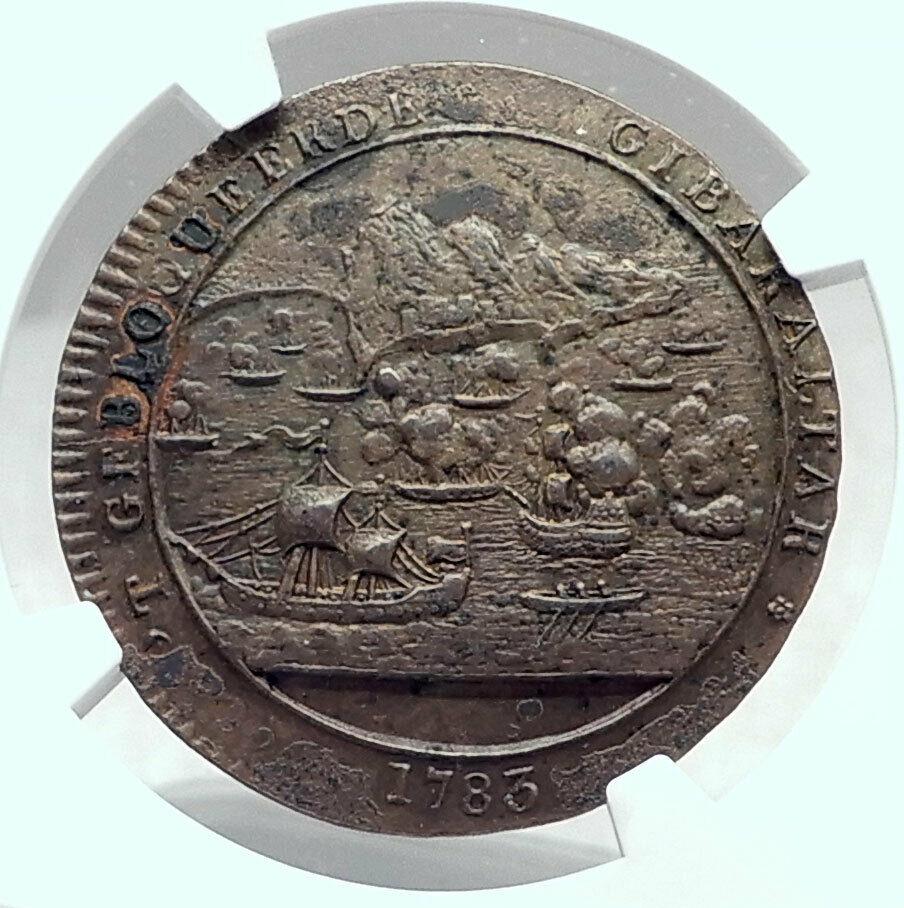|
France under Napoleon III – Emperor: 2 December 1852 – 4 September 1870
1844 Bronze Medal 25mm (5.75 grams)
IL ATTENDIAIT SON FIDELEAMI, Napoleon facing right.
CZEL BERTRAND NE EN 1772 MORT LE 31 JANVIER 1844 *, General Bertrand facing left.
You are bidding on the exact item pictured, provided with a Certificate of Authenticity and Lifetime Guarantee of Authenticity.
 Henri-Gatien Bertrand (28 March 1773 – 31 January 1844) was a French general who served during the French Revolutionary Wars and the Napoleonic Wars. Under the Empire he was the third and last Grand marshal of the palace, the head of the Military Household of emperor Napoleon Bonaparte, whom he followed in both the exiles to Elba and Saint-Helena. Henri-Gatien Bertrand (28 March 1773 – 31 January 1844) was a French general who served during the French Revolutionary Wars and the Napoleonic Wars. Under the Empire he was the third and last Grand marshal of the palace, the head of the Military Household of emperor Napoleon Bonaparte, whom he followed in both the exiles to Elba and Saint-Helena.
Bertrand was born at Châteauroux, in the province of Berry, to a well-to-do bourgeois family.
At the outbreak of the French Revolution, he had just finished his studies at the Prytanée National Militaire, and he entered the army as a volunteer. During the expedition to Egypt, Napoleon named him colonel (1798), then brigadier-general, and after the Battle of Austerlitz his aide-de-camp. His life was henceforth closely bound up with that of Napoleon, who had the fullest confidence in him, honoring him in 1808 with the title of count and at the end of 1813, with the title of Grand Marshal of the Palace.
In 1808 Bertrand married Fanny (1785-1836), the daughter of general Arthur Dillon and through her mother a cousin of the Empress Joséphine. They had six children, with one being born on Elba and another on Saint Helena.
It was Bertrand who in 1809 directed the building of the bridges by which the French army crossed the Danube at Wagram. In 1811, the Emperor appointed Bertrand governor of the Illyrian Provinces and during the German campaign of 1813, he commanded IV Corps which he led in the battles of Großbeeren, Dennewitz, Wartenburg and Leipzig.
In 1813, after the Battle of Leipzig, it was due to his initiative that the French army was not totally destroyed. He accompanied the Emperor to Elba in 1814, returned with him in 1815, held a command in the Waterloo campaign, and then, after the defeat, accompanied Napoleon to St Helena. Condemned to death in 1816, he did not return to France until after Napoleon’s death, and then Louis XVIII granted him amnesty allowing him to retain his rank. Bertrand was elected deputy in 1830 but defeated in 1834. In 1840 he was chosen to accompany the Prince of Joinville to St. Helena to retrieve and bring Napoleon’s remains to France, in what became known as the retour des cendres.
During his exile on St Helena he compiled Napoléon’s confidences in a book entitled “Les cahiers de Sainte Hélène”. The manuscript was codified and later decodified and commented by Paul Fleuriot de Langle. According to historians, this document is more accurate than Las Cases’ “Memorial de Sainte Hélène” which reached a much larger amount of readers in the 19 century as it was designed for propangadistic purposes.
Bertrand’s fourth child, Arthur, born on St. Helena, quickly became a favorite of Napoleon’s. Arthur is otherwise best known for his affair with French actress Mademoiselle Rachel, with which he had a son.
He died at Châteauroux on 31 January 1844 and was buried in Les Invalides. Alexandre Dumas mentions Bertrand in the earlier pages of his well-known novel The Count of Monte Cristo. He is also mentioned in Book II Chapter 1 of Les Misérables by Victor Hugo.
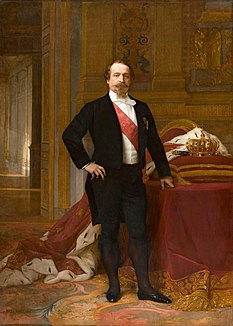 Louis-Napoléon Bonaparte (20 April 1808 – 9 January 1873) was the only President (1848-52) of the French Second Republic and, as Napoleon III, the Emperor (1852-70) of the Second French Empire. He was the nephew and heir of Napoleon I. He was the first President of France to be elected by a direct popular vote. He was blocked by the Constitution and Parliament from running for a second term, so he organized a coup d’état in 1851 and then took the throne as Napoleon III on 2 December 1852, the forty-eighth anniversary of Napoleon I’s coronation. He remains the longest-serving French head of state since the French Revolution. Louis-Napoléon Bonaparte (20 April 1808 – 9 January 1873) was the only President (1848-52) of the French Second Republic and, as Napoleon III, the Emperor (1852-70) of the Second French Empire. He was the nephew and heir of Napoleon I. He was the first President of France to be elected by a direct popular vote. He was blocked by the Constitution and Parliament from running for a second term, so he organized a coup d’état in 1851 and then took the throne as Napoleon III on 2 December 1852, the forty-eighth anniversary of Napoleon I’s coronation. He remains the longest-serving French head of state since the French Revolution.
During the first years of the Empire, Napoleon’s government imposed censorship and harsh repressive measures against his opponents. Some six thousand were imprisoned or sent to penal colonies until 1859. Thousands more went into voluntary exile abroad, including Victor Hugo. From 1862 onwards, he relaxed government censorship, and his regime came to be known as the “Liberal Empire.” Many of his opponents returned to France and became members of the National Assembly.
Napoleon III is best known today for his grand reconstruction of Paris, carried out by his prefect of the Seine Baron Haussmann. He launched similar public works projects in Marseille, Lyon, and other French cities.
Napoleon III modernized the French banking system, greatly expanded and consolidated the French railway system, and made the French merchant marine the second largest in the world. He promoted the building of the Suez Canal and established modern agriculture, which ended famines in France and made France an agricultural exporter. He negotiated the 1860 Cobden-Chevalier free trade agreement with Britain and similar agreements with France’s other European trading partners. Social reforms included giving French workers the right to strike and the right to organize. Women’s education greatly expanded, as did the list of required subjects in public schools.
In foreign policy, Napoleon III aimed to reassert French influence in Europe and around the world. He was a supporter of popular sovereignty and of nationalism. In Europe, he allied with Britain and defeated Russia in the Crimean War (1853-56). His regime assisted Italian unification and, in doing so, annexed Savoy and the County of Nice to France; at the same time, his forces defended the Papal States against annexation by Italy. Napoleon doubled the area of the French overseas empire in Asia, the Pacific, and Africa. On the other hand, his army’s intervention in Mexico aimed to create a Second Mexican Empire under French protection but ended in failure.
Beginning in 1866, Napoleon had to face the mounting power of Prussia, as Chancellor Otto von Bismarck sought German unification under Prussian leadership. In July 1870, Napoleon entered the Franco-Prussian War without allies and with inferior military forces. The French army was rapidly defeated and Napoleon III was captured at the Battle of Sedan. The French Third Republic was proclaimed in Paris, and Napoleon went into exile in England, where he died in 1873.
  France, officially the French Republic (French: République française), is a sovereign state comprising territory in western Europe and several overseas regions and territories. The European part of France, called Metropolitan France, extends from the Mediterranean Sea to the English Channel and the North Sea, and from the Rhine to the Atlantic Ocean. France spans 640,679 square kilometres (247,368 sq mi) and has a total population of 67 million. It is a unitary semi-presidential republic with the capital in Paris, the country’s largest city and main cultural and commercial centre. The Constitution of France establishes the state as secular and democratic, with its sovereignty derived from the people. France, officially the French Republic (French: République française), is a sovereign state comprising territory in western Europe and several overseas regions and territories. The European part of France, called Metropolitan France, extends from the Mediterranean Sea to the English Channel and the North Sea, and from the Rhine to the Atlantic Ocean. France spans 640,679 square kilometres (247,368 sq mi) and has a total population of 67 million. It is a unitary semi-presidential republic with the capital in Paris, the country’s largest city and main cultural and commercial centre. The Constitution of France establishes the state as secular and democratic, with its sovereignty derived from the people.
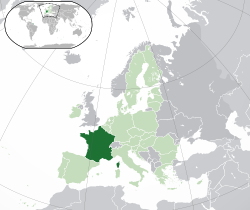
During the Iron Age, what is now Metropolitan France was inhabited by the Gauls, a Celtic people. The Gauls were conquered in 51 BC by the Roman Empire, which held Gaul until 486. The Gallo-Romans faced raids and migration from the Germanic Franks, who dominated the region for hundreds of years, eventually creating the medieval Kingdom of France. France emerged as a major European power in the Late Middle Ages, with its victory in the Hundred Years’ War (1337 to 1453) strengthening French state-building and paving the way for a future centralized absolute monarchy. During the Renaissance, France experienced a vast cultural development and established the beginning of a global colonial empire. The 16th century was dominated by religious civil wars between Catholics and Protestants (Huguenots).
France became Europe’s dominant cultural, political, and military power under Louis XIV. French philosophers played a key role in the Age of Enlightenment during the 18th century. In 1778, France became the first and the main ally of the new United States in the American Revolutionary War. In the late 18th century, the absolute monarchy was overthrown in the French Revolution. Among its legacies was the Declaration of the Rights of Man and of the Citizen, one of the earliest documents on human rights, which expresses the nation’s ideals to this day. France became one of modern history’s earliest republics until Napoleon took power and launched the First French Empire in 1804. Fighting against a complex set of coalitions during the Napoleonic Wars, he dominated European affairs for over a decade and had a long-lasting impact on Western culture. Following the collapse of the Empire, France endured a tumultuous succession of governments: the monarchy was restored, it was replaced in 1830 by a constitutional monarchy, then briefly by a Second Republic, and then by a Second Empire, until a more lasting French Third Republic was established in 1870. By the 1905 law, France adopted a strict form of secularism, called laïcité, which has become an important federative principle in the modern French society.
France reached its territorial height during the 19th and early 20th centuries, when it ultimately possessed the second-largest colonial empire in the world. In World War I, France was one of the main winners as part of the Triple Entente alliance fighting against the Central Powers. France was also one of the Allied Powers in World War II, but came under occupation by the Axis Powers in 1940. Following liberation in 1944, a Fourth Republic was established and later dissolved in the course of the Algerian War. The Fifth Republic, led by Charles de Gaulle, was formed in 1958 and remains to this day. Following World War II, most of the empire became decolonized.
Throughout its long history, France has been a leading global center of culture, making significant contributions to art, science, and philosophy. It hosts Europe’s third-largest number of cultural UNESCO World Heritage Sites (after Italy and Spain) and receives around 83 million foreign tourists annually, the most of any country in the world. France remains a great power with significant cultural, economic, military, and political influence. It is a developed country with the world’s sixth-largest economy by nominal GDP and eight-largest by purchasing power parity. According to Credit Suisse, France is the fourth wealthiest nation in the world in terms of aggregate household wealth. It also possesses the world’s second-largest exclusive economic zone (EEZ), covering 11,035,000 square kilometres (4,261,000 sq mi).
French citizens enjoy a high standard of living, and the country performs well in international rankings of education, health care, life expectancy, civil liberties, and human development. France is a founding member of the United Nations, where it serves as one of the five permanent members of the UN Security Council. It is a member of the Group of 7, North Atlantic Treaty Organization (NATO), Organisation for Economic Co-operation and Development (OECD), the World Trade Organization (WTO), and La Francophonie. France is a founding and leading member state of the European Union (EU).
|





 Henri-Gatien Bertrand (28 March 1773 – 31 January 1844) was a French general who served during the French Revolutionary Wars and the Napoleonic Wars. Under the Empire he was the third and last Grand marshal of the palace, the head of the Military Household of emperor Napoleon Bonaparte, whom he followed in both the exiles to Elba and Saint-Helena.
Henri-Gatien Bertrand (28 March 1773 – 31 January 1844) was a French general who served during the French Revolutionary Wars and the Napoleonic Wars. Under the Empire he was the third and last Grand marshal of the palace, the head of the Military Household of emperor Napoleon Bonaparte, whom he followed in both the exiles to Elba and Saint-Helena. Louis-Napoléon Bonaparte (20 April 1808 – 9 January 1873) was the only President (1848-52) of the French Second Republic and, as Napoleon III, the Emperor (1852-70) of the Second French Empire. He was the nephew and heir of Napoleon I. He was the first President of France to be elected by a direct popular vote. He was blocked by the Constitution and Parliament from running for a second term, so he organized a coup d’état in 1851 and then took the throne as Napoleon III on 2 December 1852, the forty-eighth anniversary of Napoleon I’s coronation. He remains the longest-serving French head of state since the French Revolution.
Louis-Napoléon Bonaparte (20 April 1808 – 9 January 1873) was the only President (1848-52) of the French Second Republic and, as Napoleon III, the Emperor (1852-70) of the Second French Empire. He was the nephew and heir of Napoleon I. He was the first President of France to be elected by a direct popular vote. He was blocked by the Constitution and Parliament from running for a second term, so he organized a coup d’état in 1851 and then took the throne as Napoleon III on 2 December 1852, the forty-eighth anniversary of Napoleon I’s coronation. He remains the longest-serving French head of state since the French Revolution.
 France, officially the French Republic (French: République française), is a sovereign state comprising territory in western Europe and several overseas regions and territories. The European part of France, called Metropolitan France, extends from the Mediterranean Sea to the English Channel and the North Sea, and from the Rhine to the Atlantic Ocean. France spans 640,679 square kilometres (247,368 sq mi) and has a total population of 67 million. It is a unitary semi-presidential republic with the capital in Paris, the country’s largest city and main cultural and commercial centre. The Constitution of France establishes the state as secular and democratic, with its sovereignty derived from the people.
France, officially the French Republic (French: République française), is a sovereign state comprising territory in western Europe and several overseas regions and territories. The European part of France, called Metropolitan France, extends from the Mediterranean Sea to the English Channel and the North Sea, and from the Rhine to the Atlantic Ocean. France spans 640,679 square kilometres (247,368 sq mi) and has a total population of 67 million. It is a unitary semi-presidential republic with the capital in Paris, the country’s largest city and main cultural and commercial centre. The Constitution of France establishes the state as secular and democratic, with its sovereignty derived from the people.


